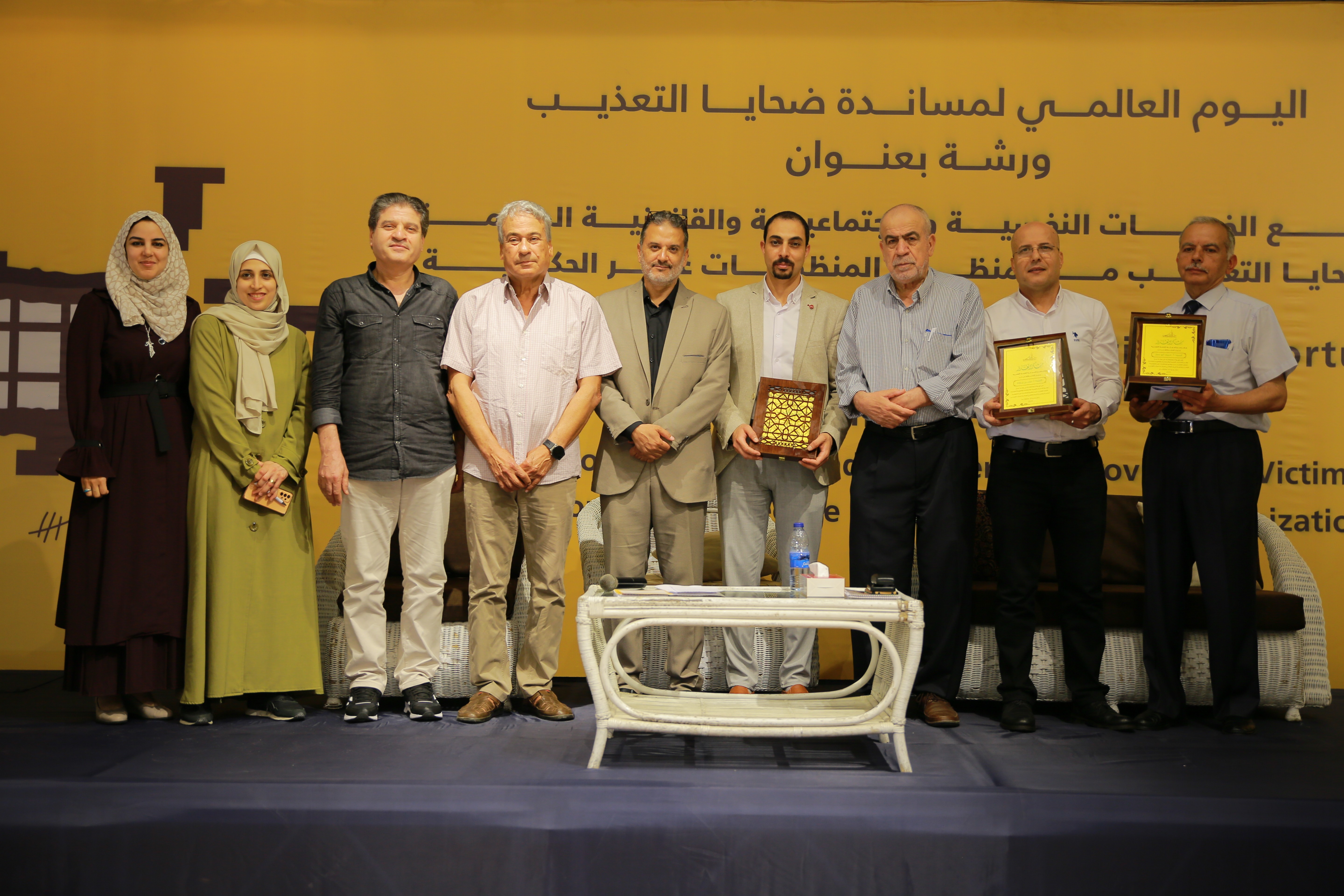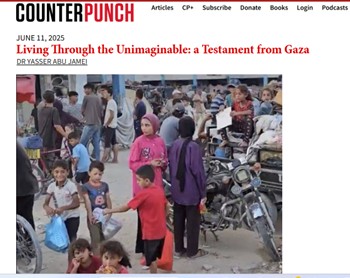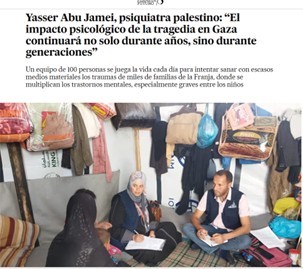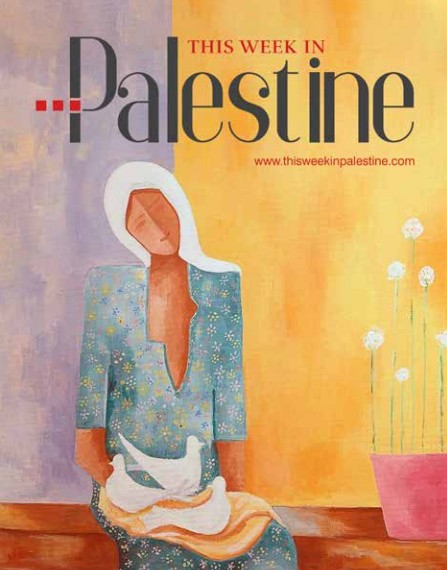
“International Day in Support of Victims of Torture – Workshop: “The Reality of Psychosocial And Legal Services Provided for Torture Survivors from the Perspective of NGOS””
Marking the International Day in Support of Victims of Torture, celebrated each year on the 26 June, Gaza Community Mental Health Programme has held a workshop to review together with partner organizations and stakeholders the achievements and challenges in supporting torture survivors.
The workshop which carried the title “The Reality of Psychosocial And Legal Services Provided for Torture Survivors from the Perspective of NGOS”, included presentations of different papers provided by legal, human rights and mental health experts.
In the opening speech, Dr Yasser Abu Jamei, Director General of GCMHP, spoke of the international definition of torture, the justifications under which it is practised.
“Torture aims at destroying the personality of the victim,” Abu Jamei said. “Iben Khaldun said more than 200 years ago that: Usually, the oppressed follow in the footsteps of the oppressor, ” Dr Abu Jamei added, quoting the famous Arab sociologist in his explanation of how torture impact the individual and the community as a whole.
In the first presentation session, psychologist Hasan Ziyadah presented GCMHP’s paper which carried the title, "The Reality of Psychological and Social Services Provided for Victims". The paper provided a revision of GCMHP’s experience and interventions with victims of torture since the establishment of the organization in 1990 and during a variety of sociopolitical contexts over 33 years. He also talked about the comprehensive nature of psychological treatment and rehabilitation services and the efforts exerted in this framework by presenting cases that have benefited from GCMHP’s services. In addition he explained the serious role played by GCMHP in dealing with torture.
Then, lawyer, Mr. Sharif Abu Nassar, a lawyer from the Palestinian Center for Human Rights presented a paper about the "Legal Services for Victims and Survivors of Torture", in which he explained the role of the Center in dealing with victims, following up and documenting torture complaints. His paper also provided an overview of the international conventions and protocols against torture that have signed by the State of Palestine.
The paper also included an explanation of the challenges that service providers face in documenting the real number of torture cases due to the difficulty of disclosing them, explaining that the reason for this is that sometimes the victims are subjected to more torture if they file a complaint. “I wonder where the rule of law is, and to what extent it is enforced,” he said.
In the second session Mr Bakr Al-Turkmani, Coordinator of Investigations and Complaints at the Independent Commission for Human Rights, presented a paper entitled, "The Role of Civil Institutions in Reporting Torture, and Legal Prosecutions", which reviewed the challenges related to accountability, and the independence of the parties involved in accountability. The paper also clarified the role of the Commission in monitoring torture incidents through a number of mechanisms such as surprise visits to detention centers, and confidential individual interviews with detainees to ensure that they are not subjected to torture, in addition to closely following up complaints.
The last paper entitled "The Reality of Rehabilitation Services Provided to Survivors of Torture", was presented via video conference from the West Bank by Mr Murad Bustami, from the Center for the Treatment and Rehabilitation of Victims of Torture. His paper provided information about a number of challenges that affect the process of rehabilitation and integration of survivors of torture, real cases of victims who were subjected to various methods of torture.
The last session was allocated for discussion between the audience and the panelists and presenting the recommendations which are listed as follows:
The official authorities should continue to issue clear instructions to the security services to NOT to practise torture or mal-treatment in during arrest, custody or investigation.
The recommendations of the United Nations Committee Against Torture, which it made as a comment on the report of the State of Palestine, submitted to discussed in July 2022.
Serious effort must be done to amend the decree-law related to the establishment of the national anti-torture mechanism, in order to make it compatible with the general principles referred to in the protocol attached to the Convention against Torture, especially with regard to the financial and administrative independency of the mechanism.
There is a need for developing tools for detecting and investigating crimes of torture, and building the skills of those using them, with the aim of reaching the perpetrators of crimes according to scientific bases, voluntarily, and without coercion, torture, or ill-treatment.
Training the personnel in charged of law enforcement and those whose responsibility is to resolve family feuds to use peaceful means and NOT to touch the physical integrity of the conflict parties.
Improving the conditions of the custody places, especially the police custody, and treating the people held there with dignity and provide them with medical services in accordance with the law.
Reinforcing accountability by bringing to account anyone proved to be involved in abusing prisoners or people in custody through administrative and civil measures, while providing any necessary psychological and physical rehabilitation for the affected.
The Public Prosecution needs to conduct serious investigations into citizens' claims of having their physical integrity abused by law enforcement officials.
The judiciary and the Public Prosecution must conduct thorough investigations into the testimonies and information provided to them by members of the judicial police in the various security agencies before deciding to hold any person in custody.
The judiciary and the Public Prosecution must play their monitoring role over all civilian places of detention, to ensure that detainees are not subjected to torture, ill-treatment or self-inflicted acts, and to investigate cases that indicate that detainees have been subjected to any form of torture and/or ill-treatment.
Lobbying the concerned authorities to expedite the establishment of a specialized hospital for providing treatment from addiction.
There must be close coordination between human rights organizations and non-governmental mental health organizations as well as the relevant official specialized departments to provide an integrated psychological service for those for the victims of torture.
Lobbying the law enforcement departments to establish a mental health fitness test for the new recruits, while also testing them while they are attending to their work in the prisons.




Read Comments
Steven Rich
March 10, 2019Omnis iste natus error sit voluptatem accusantium nam libero tempore, cum soluta nobis est eligendi optiocumque nihil impedit quo minus id quod maxime.
Van Wimbilton
March 10, 2019Natus error sit voluptatem accusantium nam libero tempore, cum soluta nobis eligendi optio cumque nihil impedit quo minus id quod maxime.